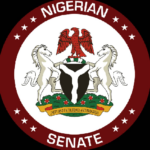The Nigerian Communication Commission (NCC) came under criticism following an outburst against the commission by the Senate and Minister of Works for openly protecting telecoms companies over increasing cases of dropped calls.
The attack came following the public hearing on a motion titled: “Increasing rate of drop calls and other unwholesome practices by telecom network operators in Nigeria that had robbed Nigerians of their hard earned billions of Naira.”
The public hearing was organised by the Senate Committee on Communications in Abuja on Wednesday.
The NCC had accused the Federal Ministry of Works of contracting construction of projects to contractors who cut cables of telecom companies, resulting into the drop calls.
The NCC Director of Technical Standards and Network Integrity, Mr Bako Wakil, said telecoms service providers had become victims of multiple taxation by states and Federal Government.
He also cited cases of vandalism of telecoms installations by criminals due to insecurity.
He said with the overstretched subscribers base, it was not easy for telecom service providers to provide the required capacity of infrastructure to adequately cover the country.
He further blamed the state and federal governments for the high cost of right of ways, saying that in some states it is N5,000 per meter, while it could be higher in some others.
He stated that in a particular month, they recorded 1,065 fiber cable cuts, even as he listed banditry, intermittent shutdown of service stations, poor power supply as part of the causes of drop calls, noting that such challenges happened only in Nigeria.
However, responding to the above claims by the NCC director, the Minister of Works, Mr Babatunde Fashola, slammed the NCC, saying that government over the past 20 years had divested in state assets.
He said that laws had also been made within the period to ensure adequate regulations, emphasising that a regulatory agency had enormous powers and must have a different nationalistic mindset if it must succeed.
According to him, the defence of double taxation by the state and federal governments on telecoms companies is ill-conceived, saying that such should not be coming from NCC that should regulate the companies.
He further dispelled the claim by NCC that there were poor power supply to the telecoms companies, reminding the senate that telecoms companies were asked to purchase their powers directly from the generating companies and bypass the distribution companies, yet they refused.
The minister, who was visibly angry over the submissions made by the NCC, urged the senate to invite more technical people to help them understand what was actually happening with regards to the drop calls.
He revealed that at the onset of telecoms deregulation, the telecoms companies were asked to co-locate their cables, masts and installations, for better security, cheaper right of way and to avoid cutting of cables by contractors, but they refused and rather went to court to challenge government.
He said the head of the regulatory agency must be on the side of Nigerians, while encouraging investors.
According to him, it is a question of service delivery to Nigerians.
Sen. Bamidele Opeyemi (APC-Ekiti) also berated the NCC for being on the side of telecoms operators.
He said the matter affected almost every Nigerian and no telecoms company accounted for the costs incurred by costumers from drop calls.
This, he said, was not allowed in other countries, regretting that everything goes in Nigeria due to collusion between regulators and operators at the detriment of poor Nigerians.

 Join Daily Trust WhatsApp Community For Quick Access To News and Happenings Around You.
Join Daily Trust WhatsApp Community For Quick Access To News and Happenings Around You.

